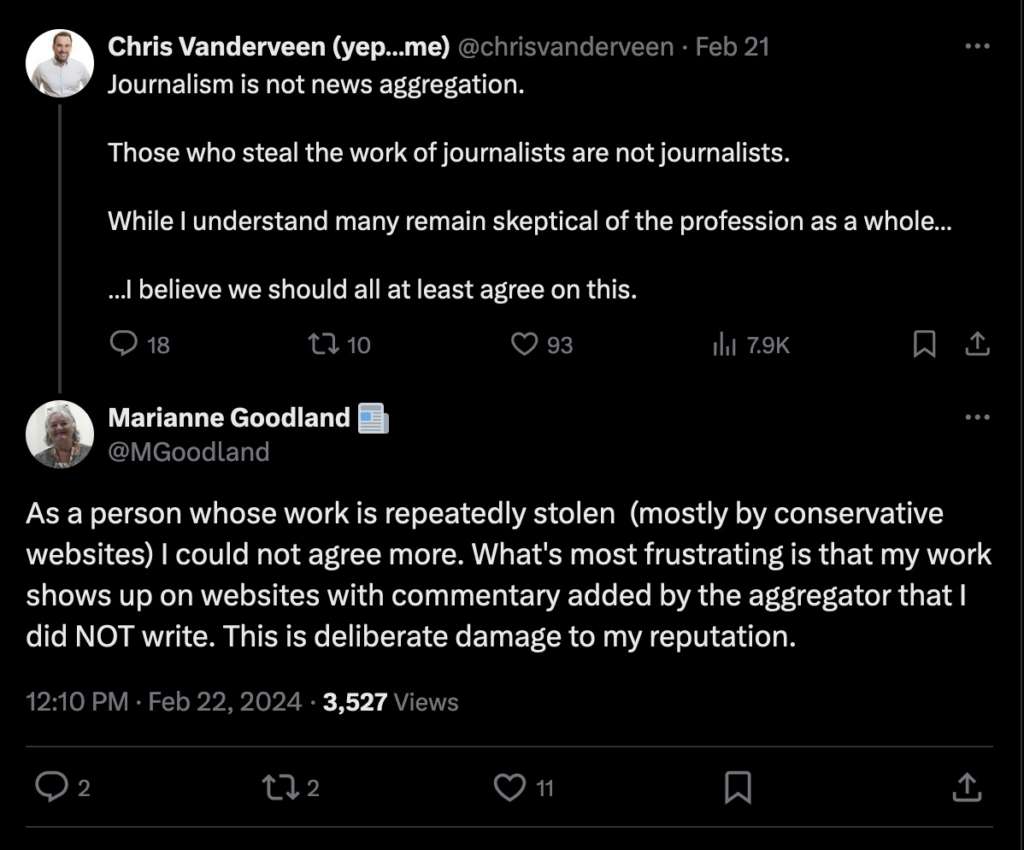An anonymous conservative news site launched just last October went offline late last month, following an inquiry by the Colorado Times Recorder.
The Lobby aggregated and rewrote news stories and republished them with eye-catching AI-generated images and, for political stories, often a headline with a playful but conservative spin. The site’s copious content from the past four months is no longer available, replaced with a banner stating that it’s “Under Construction.”
Created by Roger Hudson, a former deputy chief of staff for the Colorado House Republicans, The Lobby likely generated more ire from Colorado’s press corps than actual web traffic. Hudson insisted he wasn’t copying local political reporters’ stories to compete as a news site, but rather he described it as a personal project started to “experiment with AI.”
“I just got curious about AI and had some free time and decided to play around with it,” said Hudson. “It’s probably over, frankly, now that you’re calling me about it.”
Metrics available prior to the site being locked down indicate that there weren’t many eyeballs on its content. Statistics from The Lobby’s now-deleted YouTube channel showed just dozens of views on the handful of videos, most of which were just clips of local TV news stories.
During his conversation with the Colorado Times Recorder (CTR), Hudson made a point of saying he no longer thought he needed to repost other outlets’ news videos and instead would just link directly to the original reporting.
Hudson’s involvement with the site wasn’t difficult to find; the donation page informed contributors that their money would go to an LLC owned by Hudson. And while CTR is the first to report it publicly, at least two other major news outlets knew he was behind it, as evidenced by the cease & desist letters they say they sent to him. Editors for both the Colorado Springs and Denver Gazette papers and Colorado Politics conglomerate as well as the Colorado Sun say they asked Hudson to stop using their reporters’ material as the basis for his site’s content, both in phone conversations and via formal legal requests.
Media reporter Corey Hutchins was the first to report on The Lobby. He interviewed Colorado Politics reporter Marianne Goodland last December about the site’s same-day publication of a story based on her article.
From Hutchins:
Consider Marianne Goodland’s exclusive state budget story for Colorado Politics on Nov. 28, and one that appeared at The Lobby the same day that includes what looks like AI-generated images.
Goodland said she spent hours listening to committee hearings and did shoe-leather reporting to produce her story, and while The Lobby didn’t copy her syntax verbatim, she doesn’t believe whoever “wrote” the story did any actual reporting.
What’s worse, a tagline atop The Lobby story reads “original content” but the “only original content is mine,” an outraged Goodland said over the phone this week. “They may have rewritten bits and pieces in it and inserted their own take on the story from a conservative standpoint, but damn, that content is right out of my story.”
Sometime after Hutchins’ reporting, The Lobby’s byline changed from “Original Content from The Lobby” to just “From the Lobby.” The homepage tagline, however, continues to read: “The inside scoop from the Colorado Capitol and the Rocky Mountain West.”
Besides providing Hutchins with content for his newsletter, The Lobby has also made its way into his college class about media literacy.

“I have included The Lobby in a lesson when teaching students how to evaluate the credibility of purported online news sites,” says Hutchins, who teaches journalism at Colorado College. “I show it as an example of an opaque site and use it to explain why checking bylines is important, as is having a robust ‘About Us’ page and easily available contact information to find out who is behind a site.”
In a recent Twitter exchange with 9News reporter Chris Vanderveen, who was expressing frustration about news aggregator sites, Goodland mentioned “conservative websites” that steal her work. Reached by phone she confirmed that the sites she was referring to were The Lobby and failed GOP gubernatorial candidate Heidi Ganahl’s new website, Rocky Mountain Voice, which republishes lots of local news stories, albeit with attribution if not a link to the original story. (Another conservative aggregating site, Complete Colorado, has original reporting plus links to local stories and news sites, including The Lobby.)

Hudson’s partner in the project is Adam Johnson, a longtime Republican operative who served as the RNC’s Colorado director for the 2018 election, before joining the right-wing blog Compass Colorado and eventually Caucus Room, the recently-shuttered conservative-only social media platform. Johnson was also a presidential elector in 2020 for Kanye West’s brief campaign, a stunt orchestrated in Colorado by another Republican politico.
In a Facebook post from last October when the website launched, Johnson described The Lobby as “a media organization without the extreme political biases of the ‘left’ or the ‘right.’ We share stories from around Colorado, and the Rocky Mountain west, as well as our take on the important news of the day.”
The headlines, however, clearly gave a conservative spin to the news of the day. Here are the titles of the articles featured in The Lobby’s daily e-newsletter from Feb. 17:
“Dems Want Cheap Tiny Houses: Democrats’ Plan for Cheap Modular Housing Raises Concerns About Quality and Taxpayer Dollars”
“Property Taxes Go to Bail Out Migrant Schools: Colorado House Proposes Bill to Bail Out Public Schools with Indigent Migrants”
“The List of Guns Dems Want to Ban: Colorado Democrats Target Second Amendment Rights with Proposed Firearms Ban”
“Colorado’s Homelessness Crisis: Ignoring the Real Causes.”
Colorado Sun Editor Larry Ryckman confirmed they’d reached out to The Lobby with a cease and desist letter asking the site to not use its content.
“We’ve seen an increasing number of these sites,” said Ryckman. “It’s a game of whack-a-mole. Any time we come across someone improperly using our content, we will always protect our reporters’ work and vigorously defend our intellectual property.”
Ryckman wasn’t the only local news editor to demand The Lobby stop using its reporting. Vince Bzdek, executive editor of the Colorado Springs Gazette, Denver Gazette, and Colorado Politics website, all owned by media mogul Phil Anschutz, says they too took legal action.
“We sent these guys a cease & desist letter to stop using our stories verbatim,” said Bzdek. “And then we followed up and called the head of the organization and asked him to stop taking our stories and rewriting them as well.”

Hudson acknowledged that a “couple outlets” had contacted him and asked that their stories to be taken down, though he said he wasn’t sure if he’d received any formal cease and desist letters because he hadn’t checked The Lobby’s post office box in quite a while.
Hudson characterized it as a personal project without any institutional or major donor support.
Asked about the “Donate” button on the site that directed people to give to his LLC, Hudson laughed and said that in entire time the site had been up, he’d received no more than $200 in small contributions.
Hudson stressed that the site was essentially a hobby he started to learn more about artificial intelligence technology, particularly the image generation software. “I would build the graphics in multiple layers, just playing with what the AI could do,” he says, adding that he didn’t expect it to make money and had no plans to use it for political purposes.
The Lobby’s lack of funding and explicit political goals distinguishes it from the aforementioned Rocky Mountain Voice, which has both wealthy donors, including Common Sense Institute Board Chair Buz Koelbel and former Colorado GOP state senate candidate Tim Walsh, as well as a founder, Ganahl, who promotes her enterprise in openly partisan terms.




